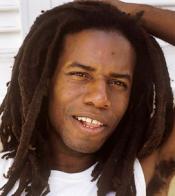 Eddy Grant (born Edmond Montague Grant, 5 March 1948), is a Plaisance, Guyana born musician. When he was still a young boy, his parents emigrated to the UK, where he settled. He had his first Number One hit in 1968, when he was the lead guitarist and main songwriter of the multiracial group The Equals, with his self-penned song "Baby Come Back". The tune also later topped the UK Singles Chart again when covered by Pato Banton. Notably, he openly used his songwriting for political purposes, especially against the then-current apartheid regime of South Africa.
Eddy Grant (born Edmond Montague Grant, 5 March 1948), is a Plaisance, Guyana born musician. When he was still a young boy, his parents emigrated to the UK, where he settled. He had his first Number One hit in 1968, when he was the lead guitarist and main songwriter of the multiracial group The Equals, with his self-penned song "Baby Come Back". The tune also later topped the UK Singles Chart again when covered by Pato Banton. Notably, he openly used his songwriting for political purposes, especially against the then-current apartheid regime of South Africa.
* In 1982, his solo recording of "I Don't Wanna Dance" spent three weeks at Number one in the UK Singles Chart. He scored a Top Ten album in the same year, with Killer On The Rampage.
* "Electric Avenue" was both a UK and U.S. number 2 in 1983, selling over a million copies. Plus, a later remix of the song was a UK Top Ten hit again in 2001.
* In 1984 Grant had a minor hit single in the U.S. with his original song written to accompany the Michael Douglas and Kathleen Turner film, Romancing the Stone. Despite being commissioned by the film's producers, all but the guitar solo would be cut from the film during its final edit. The song did not appear on its soundtrack. Grant released the song as a single with the original video that featured scenes from the film until it was re-edited without the Romancing the Stone clips.
* His later single, "Gimme Hope Jo'anna", during the apartheid regime ("Joanna" stands for Johannesburg, South Africa) was a song about apartheid in that country, and was subsequently banned by it. Lyrics include:
"Well Joanna she runs a country, she runs in Durban and the Transvaal.
She makes a few of her people happy, she don't care about the rest at all.
She got a system they call apartheid, it keeps a brother in subjection.
But maybe pressure will make Joanna see, how everybody could live as one."
This song was later adapted for use on a commercial for Yop, a commercially available yogurt-based drink, with the altered lyrics "give me Yop (me mama?) when the morning come".
* (Other songs, such as "War Party" were also political protest songs. "The only decoration is the one upon the grave". "Living On The Front Line" was another. "They got me living on top of my existence, oh appreciating my resistance")
* In 2001, Eddy Grant, The Greatest Hits was released.
Grant set up his own recording company, Ice Records, but more recently has returned to the West Indies from London, choosing Barbados as a more realistic venue for a recording company, rather than his country of origin. He has also produced for the likes of Sting, Mick Jagger and Elvis Costello.
UK chart single discography
* "Living on the Front Line" - 1979 - #11
* "Do You Feel My Love" - 1980 - #8
* "Can't Get Enough of You" - 1981 - #13
* "I Love You, Yes I Love You" - 1981 - #37
* "I Don't Wanna Dance" - 1982 - #1
* "Electric Avenue" - 1983 - #2
* "Living on the Front Line / Do You Feel My Love" - re-issue - 1983 - #47
* "War Party" - 1983 - #42
* "Till I Can't Take Love No More" - 1983 - #42
* "Romancing the Stone" - 1984 - #52
* "Boys in the Street" - 1984 - #78
* "Gimme Hope Jo'anna" - 1988 - #7
* "Harmless Piece of Fun" - 1988 - #90
* "Put a Hold on It" - 1988 #79
* "Walking on Sunshine" - 1989 - #63
* "Electric Avenue" - remix - 2001 - #5
* "Walking on Sunshine" - remix - 2001 - #57
en.wikipedia